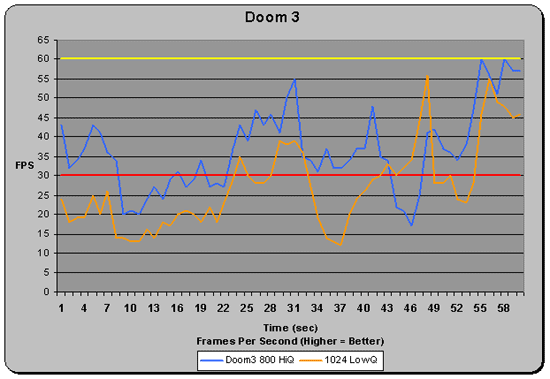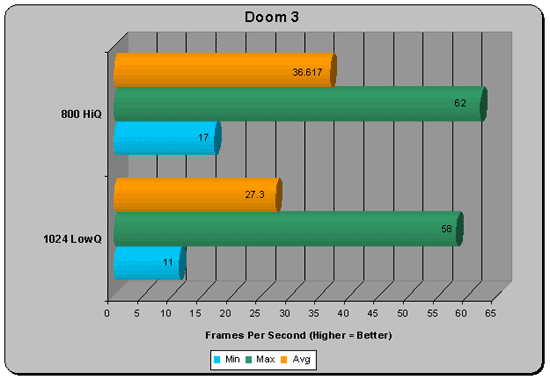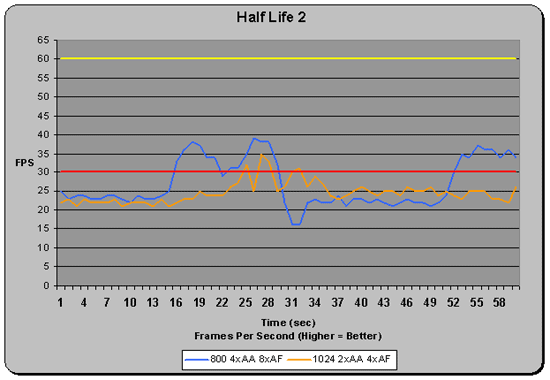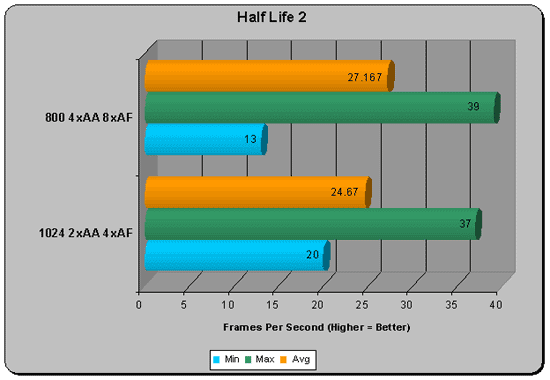In Game Testing
The Albatron Turbo Cache 6200 64mb card was tested on the following system using the nVidia 71.84 drivers. The 6200 Turbo Cache was left at stock speeds for all tests.
- DFI Lanparty UT Ultra-D
- AMD 3000+ running at 2.6ghz
- 1GB Kingstion HyperX PC3200 running at 237mhz 2-2-2-8
- 74GB Western Digital Raptor hard drive
Doom3
For the Doom 3 tests I used the Doom 3 demo as I am a poor college student who spent all my money on my computer and have nothing left over for games. To get the most realistic game play results I could I did manual run-throughs and recorded the results using Fraps a popular tool for benchmarking. I started from a saved point and timed myself hitting key points on the map for 60 seconds. This ensures that the game play is real, but also means that it?s not 100% scientific. I also found the game to be most playable at 800 by 600 resolution when set to high quality, if you don?t mind a little bit of image quality degradation then Doom was also playable at 1024 by 768 set to low quality.

The 6200 Turbo Cache was able to maintain a playable, and to my mind enjoyable, level of game play at both settings. Setting it to 800 by 600 with high quality yielded the best game play overall with improved image quality as well as higher frame rates. While both settings spend a considerable amount of time below the 30fps baseline, game play was not seriously impacted. I did notice that the 1024 by 768 setting felt more sluggish, but this was quickly put to rest as I dogged fireballs.

Fraps also gives me the maximum frame rate, minimum frame rate, and the average frame rate for my run-throughs. When set to 800 by 600 with high quality Doom 3 toped out at 62 FPS and averaged above the 30FPS threshold. Setting to 1024 by 768 with low quality saw only a small performance hit maxing out at 58 FPS and averaging just under the 30 FPS threshold with 27.3 FPS.
Half Life 2
Half Life 2 was tested under the same environment as Doom 3. I used Fraps to capture the frame rate every second as well as the max, min and average frame rates. For each test I started from a common save point and then timed myself to ensure I hit the same in game point.

I found that Half Life was playable at both 800 with 4x Anti Aliasing and 8x Aniscopic Filtering. Reducing both gave a small performance improvement but I felt that play did not suffer drastically when set higher. There was more of a performance hit taken when running 1024 by 768 with 2x Anti Aliasing and 4x Aniscopic Filtering. Both settings will yield decent play, and it?s up to you and your eyes to see which looks better.

Running the 6200 Turbo Cache at both 1024 and 800 kept the average frame rate just under the 30 FPS threshold. I did not notice any lag or stuttering using either setting while playing the game. While the 6200 Turbo Cache could not run at the full resolution of my monitor I was presently surprised by the level of game play from a budget card.

